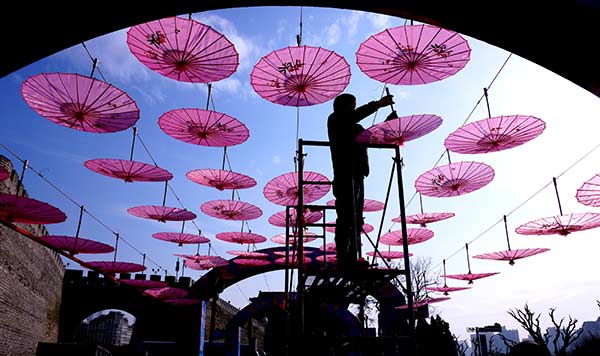Ancient Diaoyu references revived
|
|
| The original volume of Shun Feng Xiang Song, and an entry about the Diaoyu Islands. [Kevin Wang/China Daily] |
A facsimile edition of two manuscripts that are believed to be the earliest-known historical references to China’s Diaoyu Islands was unveiled at the University of Oxford on Thursday as part of this year’s London Book Fair. China Publishing Group presented the copy of the manuscripts to a group of European Sinologists at Oxford’s Bodleian Library.
The Diaoyu Islands are an uninhabited group of islands in the East China Sea.
The two ancient books, Shun Feng Xiang Song (Voyage With a Tail Wind), and Zhi Nan Zheng Fa (Compass Directions), are believed to be the world’s last existing copies that offer concrete proof of China’s sovereignty over the islands. Both original books are kept at Bodleian Library.
David Helliwell, curator of the Chinese Collection at the Bodleian, said: “These two manuscripts are important because they are the only two surviving manuscripts of the books of this kind. … This is the first time that Diaoyu is mentioned in any Chinese texts, according to what we know.”
The manuscripts are known as rutters, which are charts of compass bearings of sea routes and directions.
“These books must be common, because we know that Chinese merchants were going to all parts of the world in the late Ming Dynasty (1368-1644),” said Helliwell.
Both books record facts about the Diaoyu Islands, written among a list of place names and a list of routes in the charts.
“Diaoyu, these little islands, represent a turning point in that voyage, and they are used as markers from which to take compass bearings,” Helliwell said.
The publication of the facsimile edition is the result of a chance visit last year to the Bodleian Library by Wang Jun, department head of Zhonghua Book Co, which is owned by China Publishing Group. Wang got to know and respect Helliwell.
“Helliwell talked to us and, after a testlike little chat, invited us into the Bodleian’s internal library,” Wang said.
“He may look like a British gentleman, but I know he is Chinese inside and was Chinese in his previous life,” Wang said, praising Helliwell’s passion and knowledge of ancient Chinese books.
Speaking at the launch ceremony, Jiang Jun, vice-president of China Publishing Group, said: “The production of these two books means a lot for preserving and sorting out ancient books and sets an example for international cultural exchange and cooperation.”
The two ancient books were first identified and transcribed by Chinese historian Xiang Da when he was sent by Peking Library on an exchange program to work at the Bodleian from 1935 to 1936.
Shun Feng Xiang Song had been given to the library in 1639 by Archbishop William Laud, who was chancellor of the University from 1620 to 1641. Xiang Da strongly suspected it had been produced in the 16th century. Nan Zheng Fa is part of the Backhouse Collection, which was donated to the library in stages between 1913 and 1922. It is believed to have been written in the late Ming and early Qing (1644-1911) dynasties.

